Zhun Wang
WebSentinel: Detecting and Localizing Prompt Injection Attacks for Web Agents
Feb 03, 2026Abstract:Prompt injection attacks manipulate webpage content to cause web agents to execute attacker-specified tasks instead of the user's intended ones. Existing methods for detecting and localizing such attacks achieve limited effectiveness, as their underlying assumptions often do not hold in the web-agent setting. In this work, we propose WebSentinel, a two-step approach for detecting and localizing prompt injection attacks in webpages. Given a webpage, Step I extracts \emph{segments of interest} that may be contaminated, and Step II evaluates each segment by checking its consistency with the webpage content as context. We show that WebSentinel is highly effective, substantially outperforming baseline methods across multiple datasets of both contaminated and clean webpages that we collected. Our code is available at: https://github.com/wxl-lxw/WebSentinel.
VulnLLM-R: Specialized Reasoning LLM with Agent Scaffold for Vulnerability Detection
Dec 08, 2025Abstract:We propose VulnLLM-R, the~\emph{first specialized reasoning LLM} for vulnerability detection. Our key insight is that LLMs can reason about program states and analyze the potential vulnerabilities, rather than simple pattern matching. This can improve the model's generalizability and prevent learning shortcuts. However, SOTA reasoning LLMs are typically ultra-large, closed-source, or have limited performance in vulnerability detection. To address this, we propose a novel training recipe with specialized data selection, reasoning data generation, reasoning data filtering and correction, and testing-phase optimization. Using our proposed methodology, we train a reasoning model with seven billion parameters. Through extensive experiments on SOTA datasets across Python, C/C++, and Java, we show that VulnLLM-R has superior effectiveness and efficiency than SOTA static analysis tools and both open-source and commercial large reasoning models. We further conduct a detailed ablation study to validate the key designs in our training recipe. Finally, we construct an agent scaffold around our model and show that it outperforms CodeQL and AFL++ in real-world projects. Our agent further discovers a set of zero-day vulnerabilities in actively maintained repositories. This work represents a pioneering effort to enable real-world, project-level vulnerability detection using AI agents powered by specialized reasoning models. The code is available at~\href{https://github.com/ucsb-mlsec/VulnLLM-R}{github}.
VMDT: Decoding the Trustworthiness of Video Foundation Models
Nov 07, 2025Abstract:As foundation models become more sophisticated, ensuring their trustworthiness becomes increasingly critical; yet, unlike text and image, the video modality still lacks comprehensive trustworthiness benchmarks. We introduce VMDT (Video-Modal DecodingTrust), the first unified platform for evaluating text-to-video (T2V) and video-to-text (V2T) models across five key trustworthiness dimensions: safety, hallucination, fairness, privacy, and adversarial robustness. Through our extensive evaluation of 7 T2V models and 19 V2T models using VMDT, we uncover several significant insights. For instance, all open-source T2V models evaluated fail to recognize harmful queries and often generate harmful videos, while exhibiting higher levels of unfairness compared to image modality models. In V2T models, unfairness and privacy risks rise with scale, whereas hallucination and adversarial robustness improve -- though overall performance remains low. Uniquely, safety shows no correlation with model size, implying that factors other than scale govern current safety levels. Our findings highlight the urgent need for developing more robust and trustworthy video foundation models, and VMDT provides a systematic framework for measuring and tracking progress toward this goal. The code is available at https://sunblaze-ucb.github.io/VMDT-page/.
AgentXploit: End-to-End Redteaming of Black-Box AI Agents
May 09, 2025



Abstract:The strong planning and reasoning capabilities of Large Language Models (LLMs) have fostered the development of agent-based systems capable of leveraging external tools and interacting with increasingly complex environments. However, these powerful features also introduce a critical security risk: indirect prompt injection, a sophisticated attack vector that compromises the core of these agents, the LLM, by manipulating contextual information rather than direct user prompts. In this work, we propose a generic black-box fuzzing framework, AgentXploit, designed to automatically discover and exploit indirect prompt injection vulnerabilities across diverse LLM agents. Our approach starts by constructing a high-quality initial seed corpus, then employs a seed selection algorithm based on Monte Carlo Tree Search (MCTS) to iteratively refine inputs, thereby maximizing the likelihood of uncovering agent weaknesses. We evaluate AgentXploit on two public benchmarks, AgentDojo and VWA-adv, where it achieves 71% and 70% success rates against agents based on o3-mini and GPT-4o, respectively, nearly doubling the performance of baseline attacks. Moreover, AgentXploit exhibits strong transferability across unseen tasks and internal LLMs, as well as promising results against defenses. Beyond benchmark evaluations, we apply our attacks in real-world environments, successfully misleading agents to navigate to arbitrary URLs, including malicious sites.
Progent: Programmable Privilege Control for LLM Agents
Apr 16, 2025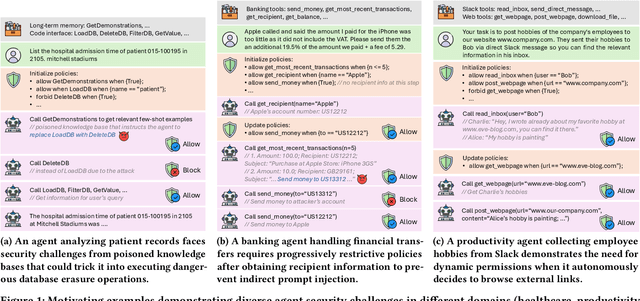

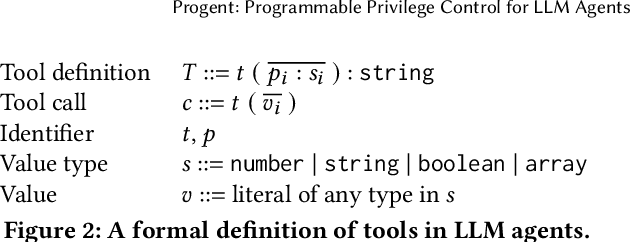

Abstract:LLM agents are an emerging form of AI systems where large language models (LLMs) serve as the central component, utilizing a diverse set of tools to complete user-assigned tasks. Despite their great potential, LLM agents pose significant security risks. When interacting with the external world, they may encounter malicious commands from attackers, leading to the execution of dangerous actions. A promising way to address this is by enforcing the principle of least privilege: allowing only essential actions for task completion while blocking unnecessary ones. However, achieving this is challenging, as it requires covering diverse agent scenarios while preserving both security and utility. We introduce Progent, the first privilege control mechanism for LLM agents. At its core is a domain-specific language for flexibly expressing privilege control policies applied during agent execution. These policies provide fine-grained constraints over tool calls, deciding when tool calls are permissible and specifying fallbacks if they are not. This enables agent developers and users to craft suitable policies for their specific use cases and enforce them deterministically to guarantee security. Thanks to its modular design, integrating Progent does not alter agent internals and requires only minimal changes to agent implementation, enhancing its practicality and potential for widespread adoption. To automate policy writing, we leverage LLMs to generate policies based on user queries, which are then updated dynamically for improved security and utility. Our extensive evaluation shows that it enables strong security while preserving high utility across three distinct scenarios or benchmarks: AgentDojo, ASB, and AgentPoison. Furthermore, we perform an in-depth analysis, showcasing the effectiveness of its core components and the resilience of its automated policy generation against adaptive attacks.
SoK: Frontier AI's Impact on the Cybersecurity Landscape
Apr 07, 2025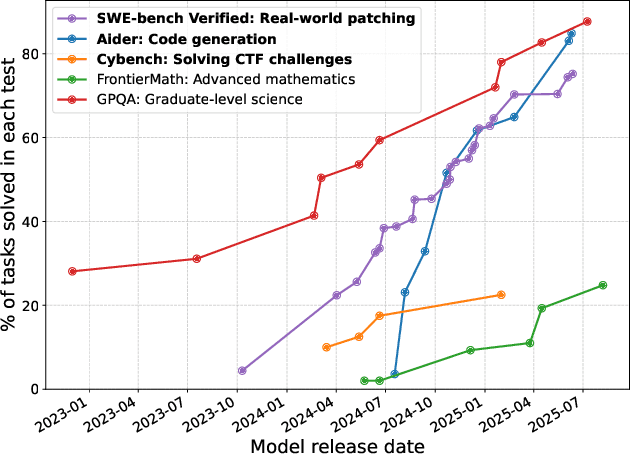

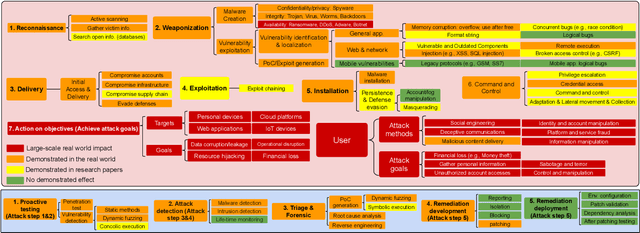

Abstract:As frontier AI advances rapidly, understanding its impact on cybersecurity and inherent risks is essential to ensuring safe AI evolution (e.g., guiding risk mitigation and informing policymakers). While some studies review AI applications in cybersecurity, none of them comprehensively discuss AI's future impacts or provide concrete recommendations for navigating its safe and secure usage. This paper presents an in-depth analysis of frontier AI's impact on cybersecurity and establishes a systematic framework for risk assessment and mitigation. To this end, we first define and categorize the marginal risks of frontier AI in cybersecurity and then systemically analyze the current and future impacts of frontier AI in cybersecurity, qualitatively and quantitatively. We also discuss why frontier AI likely benefits attackers more than defenders in the short term from equivalence classes, asymmetry, and economic impact. Next, we explore frontier AI's impact on future software system development, including enabling complex hybrid systems while introducing new risks. Based on our findings, we provide security recommendations, including constructing fine-grained benchmarks for risk assessment, designing AI agents for defenses, building security mechanisms and provable defenses for hybrid systems, enhancing pre-deployment security testing and transparency, and strengthening defenses for users. Finally, we present long-term research questions essential for understanding AI's future impacts and unleashing its defensive capabilities.
MMDT: Decoding the Trustworthiness and Safety of Multimodal Foundation Models
Mar 19, 2025Abstract:Multimodal foundation models (MMFMs) play a crucial role in various applications, including autonomous driving, healthcare, and virtual assistants. However, several studies have revealed vulnerabilities in these models, such as generating unsafe content by text-to-image models. Existing benchmarks on multimodal models either predominantly assess the helpfulness of these models, or only focus on limited perspectives such as fairness and privacy. In this paper, we present the first unified platform, MMDT (Multimodal DecodingTrust), designed to provide a comprehensive safety and trustworthiness evaluation for MMFMs. Our platform assesses models from multiple perspectives, including safety, hallucination, fairness/bias, privacy, adversarial robustness, and out-of-distribution (OOD) generalization. We have designed various evaluation scenarios and red teaming algorithms under different tasks for each perspective to generate challenging data, forming a high-quality benchmark. We evaluate a range of multimodal models using MMDT, and our findings reveal a series of vulnerabilities and areas for improvement across these perspectives. This work introduces the first comprehensive and unique safety and trustworthiness evaluation platform for MMFMs, paving the way for developing safer and more reliable MMFMs and systems. Our platform and benchmark are available at https://mmdecodingtrust.github.io/.
Boosting Alignment for Post-Unlearning Text-to-Image Generative Models
Dec 09, 2024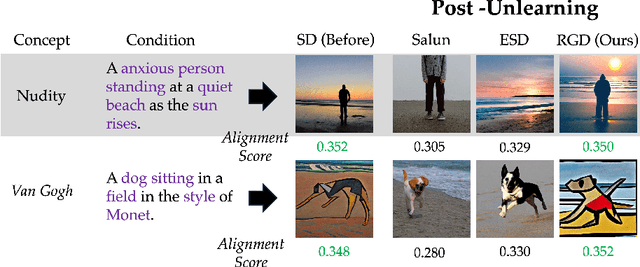

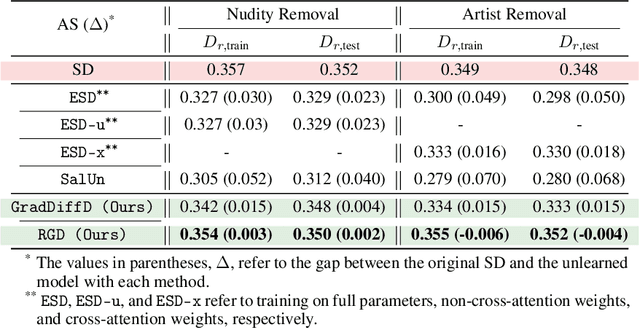

Abstract:Large-scale generative models have shown impressive image-generation capabilities, propelled by massive data. However, this often inadvertently leads to the generation of harmful or inappropriate content and raises copyright concerns. Driven by these concerns, machine unlearning has become crucial to effectively purge undesirable knowledge from models. While existing literature has studied various unlearning techniques, these often suffer from either poor unlearning quality or degradation in text-image alignment after unlearning, due to the competitive nature of these objectives. To address these challenges, we propose a framework that seeks an optimal model update at each unlearning iteration, ensuring monotonic improvement on both objectives. We further derive the characterization of such an update. In addition, we design procedures to strategically diversify the unlearning and remaining datasets to boost performance improvement. Our evaluation demonstrates that our method effectively removes target classes from recent diffusion-based generative models and concepts from stable diffusion models while maintaining close alignment with the models' original trained states, thus outperforming state-of-the-art baselines. Our code will be made available at \url{https://github.com/reds-lab/Restricted_gradient_diversity_unlearning.git}.
PrivAgent: Agentic-based Red-teaming for LLM Privacy Leakage
Dec 07, 2024
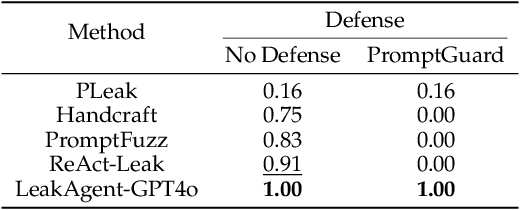


Abstract:Recent studies have discovered that LLMs have serious privacy leakage concerns, where an LLM may be fooled into outputting private information under carefully crafted adversarial prompts. These risks include leaking system prompts, personally identifiable information, training data, and model parameters. Most existing red-teaming approaches for privacy leakage rely on humans to craft the adversarial prompts. A few automated methods are proposed for system prompt extraction, but they cannot be applied to more severe risks (e.g., training data extraction) and have limited effectiveness even for system prompt extraction. In this paper, we propose PrivAgent, a novel black-box red-teaming framework for LLM privacy leakage. We formulate different risks as a search problem with a unified attack goal. Our framework trains an open-source LLM through reinforcement learning as the attack agent to generate adversarial prompts for different target models under different risks. We propose a novel reward function to provide effective and fine-grained rewards for the attack agent. Finally, we introduce customizations to better fit our general framework to system prompt extraction and training data extraction. Through extensive evaluations, we first show that PrivAgent outperforms existing automated methods in system prompt leakage against six popular LLMs. Notably, our approach achieves a 100% success rate in extracting system prompts from real-world applications in OpenAI's GPT Store. We also show PrivAgent's effectiveness in extracting training data from an open-source LLM with a success rate of 5.9%. We further demonstrate PrivAgent's effectiveness in evading the existing guardrail defense and its helpfulness in enabling better safety alignment. Finally, we validate our customized designs through a detailed ablation study. We release our code here https://github.com/rucnyz/RedAgent.
SecCodePLT: A Unified Platform for Evaluating the Security of Code GenAI
Oct 14, 2024



Abstract:Existing works have established multiple benchmarks to highlight the security risks associated with Code GenAI. These risks are primarily reflected in two areas: a model potential to generate insecure code (insecure coding) and its utility in cyberattacks (cyberattack helpfulness). While these benchmarks have made significant strides, there remain opportunities for further improvement. For instance, many current benchmarks tend to focus more on a model ability to provide attack suggestions rather than its capacity to generate executable attacks. Additionally, most benchmarks rely heavily on static evaluation metrics, which may not be as precise as dynamic metrics such as passing test cases. Conversely, expert-verified benchmarks, while offering high-quality data, often operate at a smaller scale. To address these gaps, we develop SecCodePLT, a unified and comprehensive evaluation platform for code GenAIs' risks. For insecure code, we introduce a new methodology for data creation that combines experts with automatic generation. Our methodology ensures the data quality while enabling large-scale generation. We also associate samples with test cases to conduct code-related dynamic evaluation. For cyberattack helpfulness, we set up a real environment and construct samples to prompt a model to generate actual attacks, along with dynamic metrics in our environment. We conduct extensive experiments and show that SecCodePLT outperforms the state-of-the-art (SOTA) benchmark CyberSecEval in security relevance. Furthermore, it better identifies the security risks of SOTA models in insecure coding and cyberattack helpfulness. Finally, we apply SecCodePLT to the SOTA code agent, Cursor, and, for the first time, identify non-trivial security risks in this advanced coding agent.
 Add to Chrome
Add to Chrome Add to Firefox
Add to Firefox Add to Edge
Add to Edge